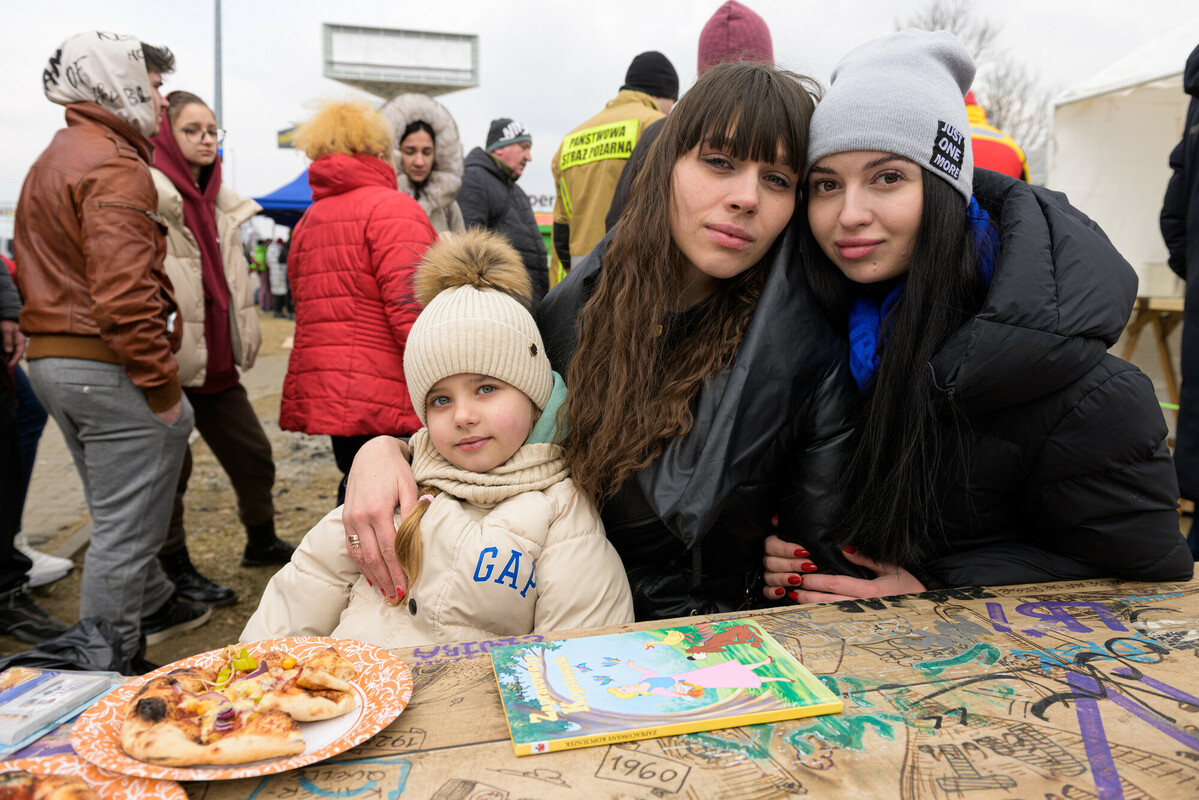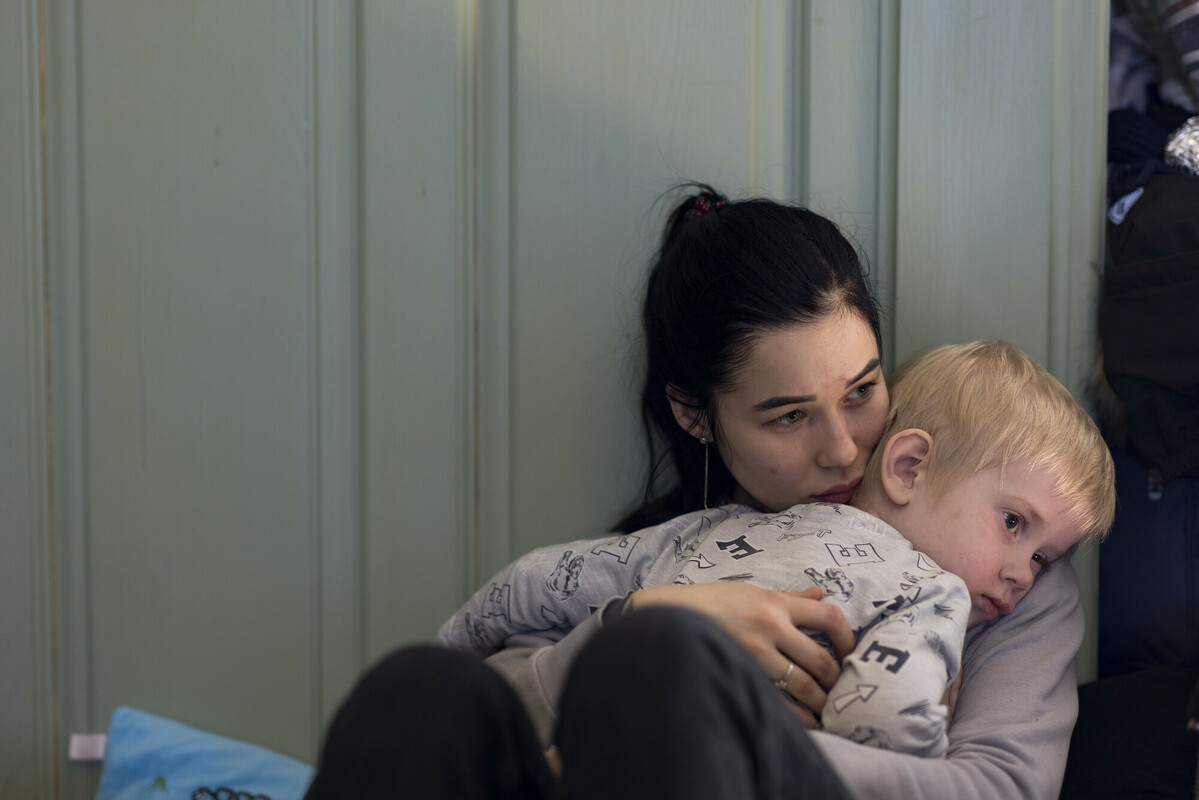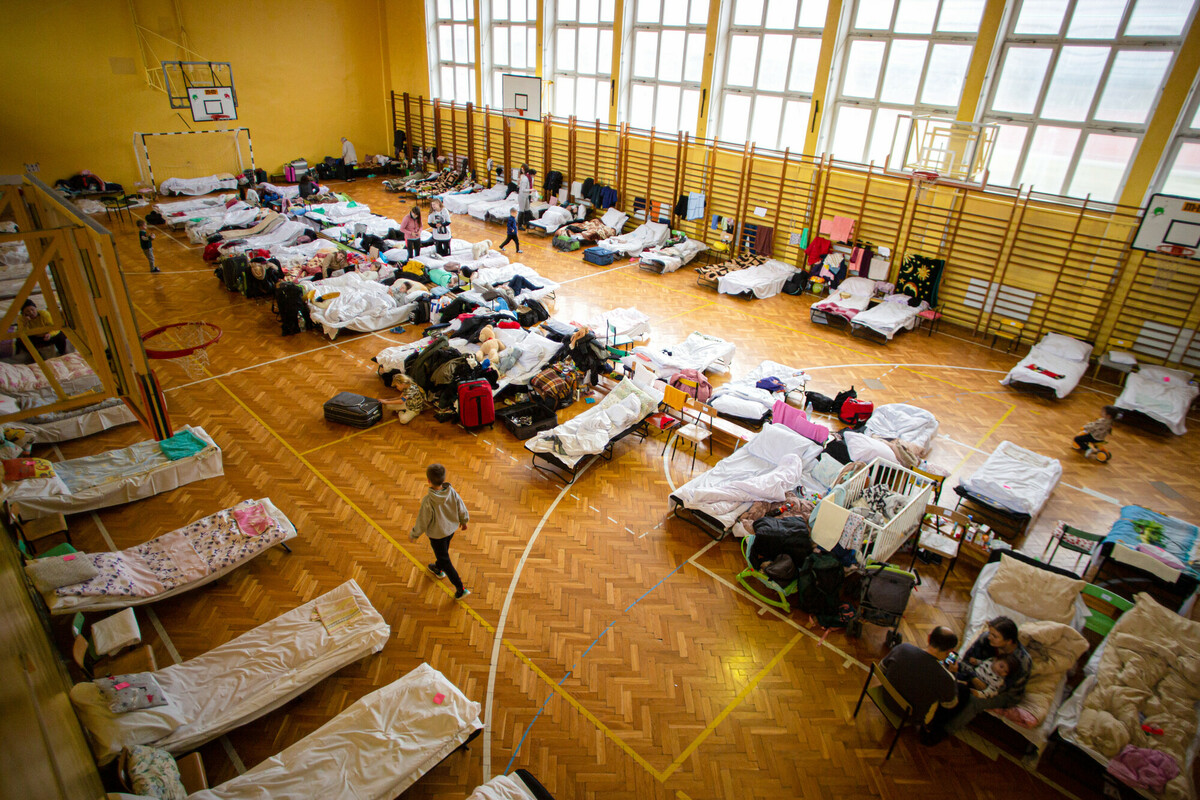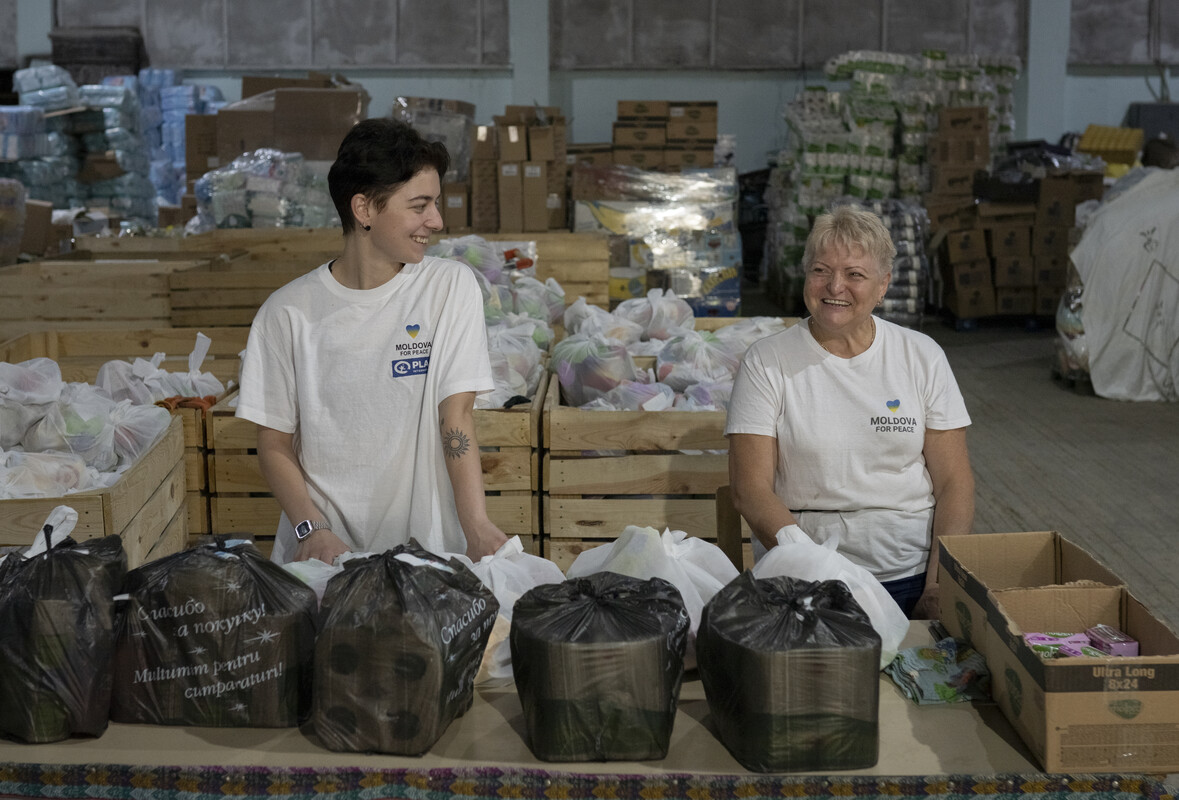“My apartment doesn’t exist anymore. The whole block has been destroyed,” said Natalya*, sitting at a table with her cousin Angelika outside a refugee reception centre in Poland, near the border with Ukraine which they had crossed hours earlier.
Natalya*, 26, had been living in Kharkiv in eastern Ukraine when Russian forces crossed the border in the early hours of 24 February 2022. Airstrikes and fighting were reported across the country. During the first week of the escalation of the conflict, many civilian buildings were damaged or destroyed and fighting spread to heavily populated areas.
After two days hiding in a friend’s basement, Natalya decided to leave, enduring a terrifying journey across the country on a packed train, meeting up with Angelika and her four-year-old daughter, from Khmelnytskyi in the west of the country, along the route. “All the time we were shut up in the carriages and could not get out,” she said. “There were no lights on the train at night. They were probably trying to protect the train from shelling." It was only once she’d reached safety that she received photos of her destroyed apartment block.

Huge numbers of people fled Ukraine in the early days of the conflict with similar stories. Many, like Natalya arrived with barely any belongings in freezing conditions, with nowhere to go. “Now we are waiting while some people are looking for somewhere for us to stay,” said Natalya. “We don’t know where we will go. We don’t want to go too far from Ukraine.”
Fearing for their lives, more than a million people fled Ukraine in the first week of the conflict, mostly into neighbouring countries such as Poland, Romania, Moldova and Hungary. After the first month, the figure was 3.6 million – the largest movement of people in Europe since the Second World War. The sudden exodus put huge pressure on existing services in neighbouring countries which were unprepared to deal with a humanitarian crisis of such magnitude.
“It was a completely unexpected event,” said Bogdan Simion, Executive Director of SERA Romania, a local partner of DEC charity CARE International. “It is the first major refugee crisis in the last 60 years for Romania, so we were inexperienced... Amazingly, the emotional response was really positive, very warm. Everybody mobilised from the first few days, starting with normal citizens, to most of the NGOs working near the frontiers.”
The sudden and unexpected nature of the crisis meant that governments were also not prepared to deal with large numbers of refugees. "This is the first humanitarian emergency Moldova has faced since it got its independence in 1991, so we don’t really have the mechanisms or tools to deal with it,” says Anna Celac, a Communications Specialist, with Plan International Moldova. “In particular the government didn’t have the necessary tools for this kind of refugee influx."
While charities within Ukraine quickly moved to deal with the immediate impacts of the conflict, helping people in bomb shelters, they also had to set up at the country’s borders to receive huge numbers of women and children arriving, often freezing cold, traumatised and with nowhere to go.
“The first few weeks were quite difficult because we were seeing refugees coming day after day, with long lines of people on the frontier some of them starving, some of them suffering from the cold,” says Bogdan Simion of SERA Romania.
Charities immediately mobilised to respond to refugees’ needs and deliver aid at or near border crossing points. Hot meals, winter clothes and basic items such as toothbrushes and children's nappies, transport onwards and temporary accommodation were all vital. In the first six months of the crisis, more than 127,000 people accessed basic services at transit centres thanks to DEC funding, and 260,000 people received food assistance in the form of hot meals or food packages across Poland, Romania and Moldova.
But such were the numbers of people arriving, often in small border towns or villages, that there was also a need to set up temporary infrastructure. “Our team was at the [Poland-Ukraine] border from the first few weeks onwards supporting with crucial [water, sanitation and hygiene] facilities,” explains Lisa Scharinger, Oxfam’s Interim Country Lead for the Poland – Ukraine Response. “For example, hand-washing stations, mobile toilets for people arriving at the border and queuing there. And we are still providing showers, toilets, drinking-water fountains and hygiene items in one of the largest reception centres in this region.”

DEC funding was made available within just days of the launch of the appeal. While some DEC charities opted to fund the early part of the response through their own retained income or from other funding sources, early DEC funding was vital for others, filling key gaps and providing charities with the confidence that more funds were available to deal with ongoing needs.
“I want to underline the very quick response of the DEC,” says Bogdan Simion of SERA Romania, local partner of DEC charity CARE International. “One of the major characteristics of the refugee response that it was very quickly deployed. Also, all this financial response was based on local organisations, so, the flexibility of the financing was great.”
Andrei Craciun, Area Manager for Save the Children in Romania says it was “extremely useful” to have DEC funding so early. “It was the first to be made available for the response,” he says, “and it meant we could immediately respond to people on the border and then support activities for the refugees transiting through the country and those trying to settle.”
“With DEC funding we could cover all the basic needs of the new arrivals of people displaced from Ukraine, particularly in Moldova,” says Eka Zhvania, World Vision Country Response Director, Romania & Moldova. “With this funding, World Vision directly, and through its partner organisations, has been providing food and non-food items, hot meals, also providing accommodation costs for half a year... We were able to support two refugee shelters for the first six months where the newly arrived displaced population would stay for three to four days on a temporary basis until they would get more longer-term accommodation."
In the early days of the crisis there were reports of people of colour and ethnic minorities suffering discrimination while trying to flee the conflict. DEC charities always seek to help those most in need regardless of race, religion or any other factor. One family helped by Save the Children had become refugees for the second time in a year, having fled Afghanistan in 2021 over fears for their safety. Hear their story below.
In April 2022, the UN and humanitarian aid agencies launched an appeal for $1.85 billion (£1.51 billion) to support refugees fleeing to surrounding countries. With martial law meaning men under 60 years of age had to stay behind, a staggering 90% of those fleeing were women and children, according to UNHCR, the UN Refugee Agency. Millions of women now found themselves alone and on the move, in many cases after having been displaced multiple times already within Ukraine.
This led to fears of trafficking, exploitation and gender-based violence, as women, and in some cases unaccompanied children, made long and complex journeys across multiple countries, in search of safety and support.
In Romania and Moldova organisations specialised in anti-trafficking, gender-based violence and child protection stepped up to assist border forces and governments to ensure the safety of the millions of women and children arriving and transiting through their countries. With DEC funding, organisations were able to bolster government systems for tracking and registering new arrivals, as well as providing prevention activities and information on how to avoid trafficking risks to those travelling onwards.
“[Our partner AVE Copiii] created a whole database to track unaccompanied children and enhance existing tools for the border police,” said Anna Celac of Plan International Moldova, “because at the beginning of the refugee crisis the scanning tools for unaccompanied children were not good enough to make sure they had the proper documents, especially for those in transit trying to move on to the EU.”
By tracking and making people more aware of methods used by traffickers, DEC charities and their partners contributed to preventing large-scale exploitation in the early days of the crisis and disrupt recruitment by trafficking groups.
“We’ve seen not just the need for our work, but also the impact of the work,” says Loredana Urzica-Mirea, Executive Director of eLiberare, a Romanian anti-trafficking organisation partnered with DEC charities ActionAid and Oxfam. “Whether it's a mum who comes in and talks about how she used the information in order to prevent her child from being groomed online, or whether it's a group of women who come together and say that they feel like they're stronger and safer, or whether it's the potential victim who then says, ‘OK, now I feel empowered enough to go and report this to the authorities’.” For more information on safeguarding see Vulnerable Groups.

Once they’d reached the safety of the border and reception centres, refugees had to face up to the challenges of everyday life and all that entailed: looking after themselves and their families, finding temporary shelter, food, medical assistance and purpose.
Food was often the most pressing need. With DEC funds, HelpAge in Moldova supplied three hot meals a day to 1,990 people in 32 refugee centres managed by a local authority in a variety of buildings such as student dorms.
As well as allowing charities to quickly scale up to meet the complex needs of refugees in the early days of the conflict, appeal funds have also been crucial in supporting them in an ongoing basis, once they’d settled into temporary accommodation.
For example, JRS, a partner of DEC charity CAFOD in Romania, ran an accommodation centre in Bucharest. On arrival, refugees were given one or two nights in a shelter before being moved to a hotel, which JRS had taken over, for three weeks.
After that the refugees were assessed and those that intended to stay for the medium-term – around six months or longer – were found apartments and helped with rent and utilities. In the first six months JRS was able to assist 153 families in this way using DEC funds, one of many such projects across the response.
Refugees were also given cash payments for a range of basic needs such as food, transport and medicine, until they could find work of their own.
“When I first got here I just wanted to sit and look at the phone, or stare at the wall. I didn’t want to talk to anyone,” said Viktoriia*, a professional dancer and acrobat from Kyiv who was also hired by JRS to work as a translator, when interviewed in July 2022. “They gave me money, a hotel room, a job. I couldn’t believe I met people like this. They helped me remake myself, helped me to heal and to come back to my normal condition. It’s taken two months, but now I can say I’m ‘normal’.”
In Romania 66% of DEC assistance to refugees was provided as cash payments. The Romanian Red Cross reached almost 18,000 refugee families with emergency cash assistance for a three-month period using DEC funds from the British Red Cross. Participants were able to register themselves through a phone app, available in Ukrainian, Russian and English. Information about the programme was posted at border crossings and in temporary collective accommodation centres, airports and train stations. A national call centre was set up to help people navigate the system, handling 50–100 calls a day.
While refugees often said they found it impossible to plan for the future during the spring and summer of 2022, unsure of how long the conflict would continue, many kept themselves busy by volunteering to help other refugees, or using what little they have to send supplies to people back in Ukraine.

Plan International are supporting a local charity in Moldova called Moldova for Peace which has many volunteers who are themselves refugees. “When I arrived in Moldova I realised that I can't do what I love on the same level as before so I was looking for a different way to be helpful,” said Janna*, a dance teacher from Odesa who volunteers to pack food parcels at the Moldova for Peace warehouse. “It is very comforting to know that you’re doing something important.”
“The British people may not even realise what contribution they are making to people's lives,” she added. “Maybe for them, making a donation is not that big of a deal, but everything they do makes a huge difference. Bigger than they can imagine because a lot of families come here with nothing.”
For more on how refugees are being supported in the longer term by DEC funds see Life as Refugees.
*Names changed to protect identities.